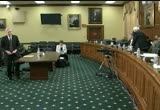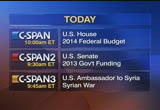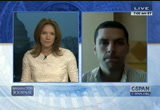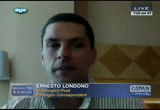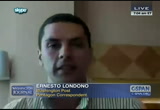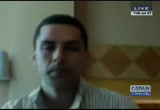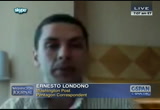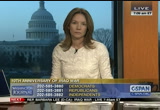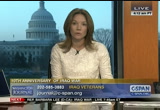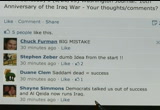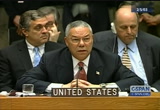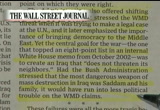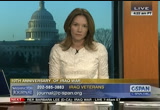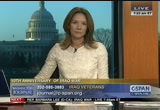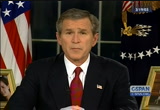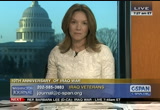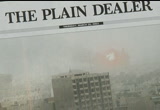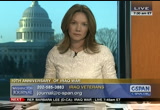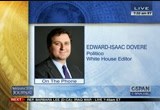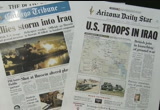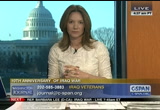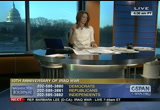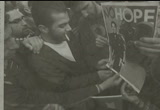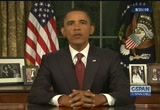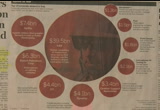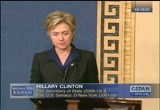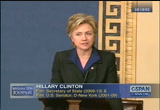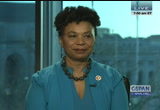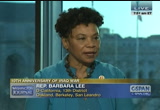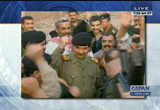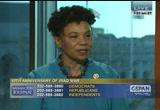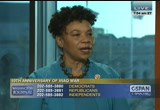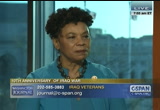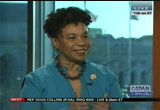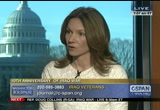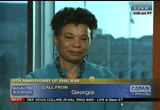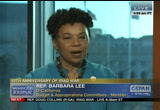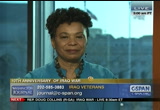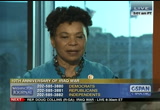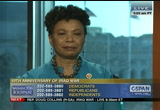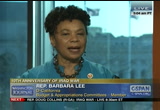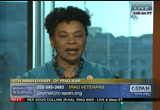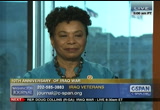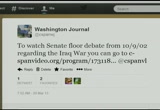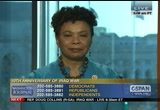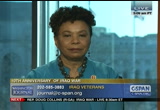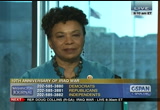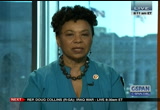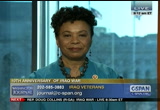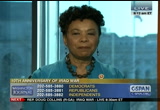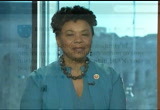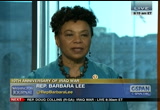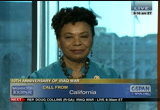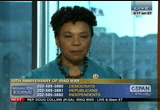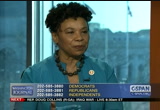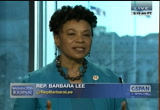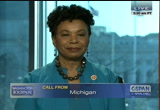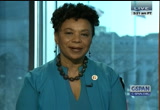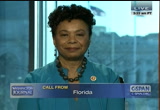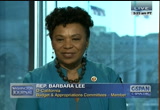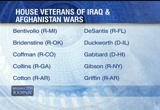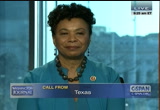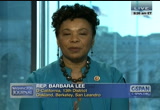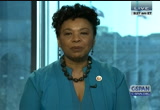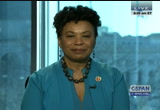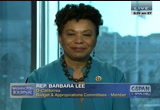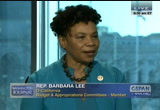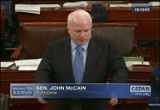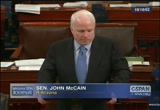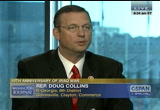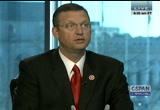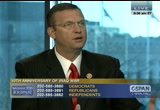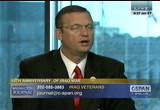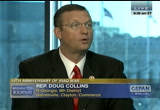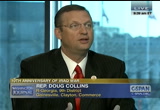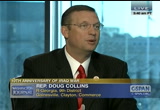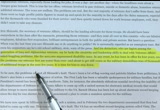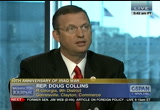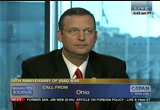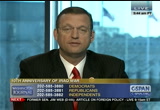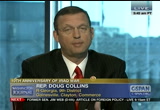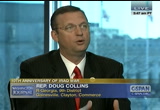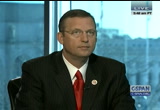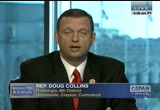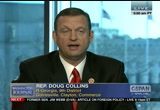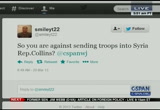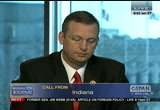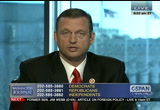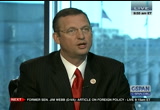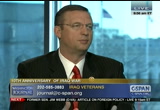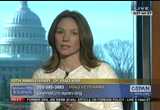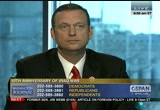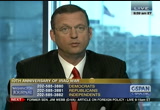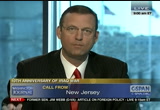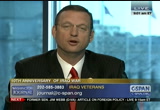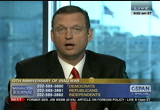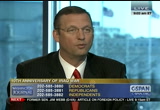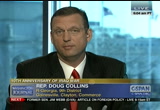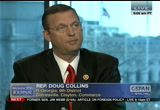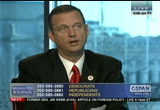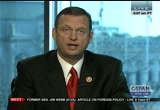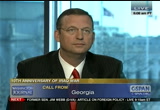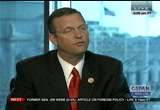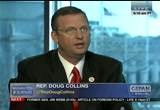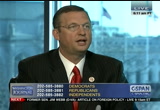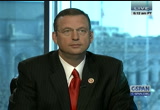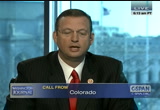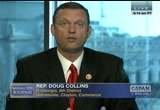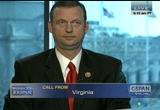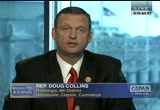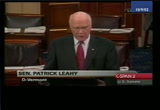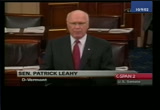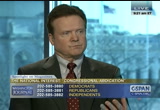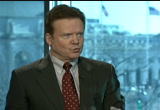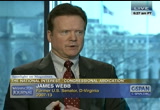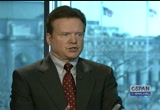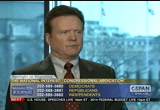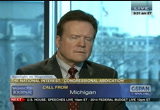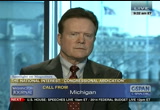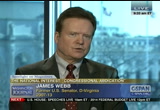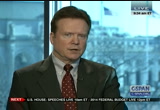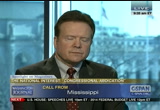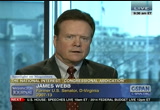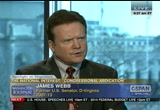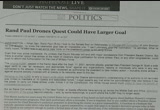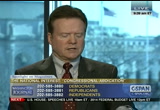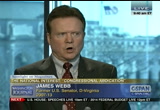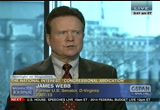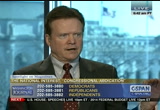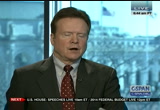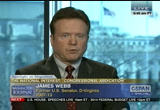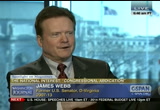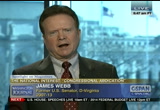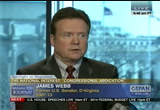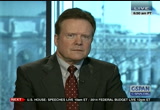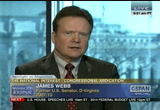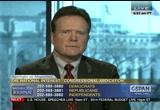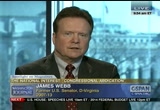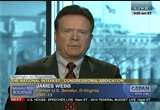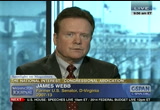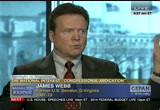tv Washington Journal CSPAN March 20, 2013 7:00am-10:00am EDT
7:00 am
women of the bureau. the hearing is adjourned. [captions copyright national cable satellite corp. 2013] [captioning performed by national captioning institute] >> the federal reserve will finish up a two day meeting on the economy this afternoon. then fed chairman ben bernanke will hold a news conference. we will have live coverage of his remarks to reporters at 2:30 eastern on c-span3. here's some of what we're covering this morning. the house is expected to finish work on the republican budget of the 2014 budget. live coverage of 10:00 eastern on c-span. on c-span2, the senate is working on a measure to fund the federal government for the rest of the fiscal year. testifying about the ongoing two year civil war in syria. that live hearing starts at 9:45 eastern. this week marks the 10th
7:01 am
anniversary of the start of the iraq war. in 45 minutes we will talk with california representative barbara lee, who opposed u.s. military action in iraq. and a congressman who served as a u.s. air force reserve chaplin, we will get his perspective on the war and veterans' issues. will, a virginia senator join us as part of our spotlight on magazine series. he writes about the role of congress in u.s. foreign policy. we will also take your calls, e- mails, and host: good morning, and welcome to the washington journal. the federal reserve chairman holds his news conference with .eporters
7:02 am
u.s. aid officials testify on syria. the commerce panel hears from ,he faa about sequestration and a hearing on domestic use of drones. all those events and more on c- span.org. 10 years ago today marks the us- led invasion into iraq. that is where we begin this morning to get your take on the 10th anniversary. here are the numbers -- host: send us a tweet or post your comments on facebook. we will get to your phone calls in just a minute. is the us from baghdad pentagon correspondent for the washington post. begin with your headline this morning.
7:03 am
at least 60 are killed in iraq on tuesday. what happened, and is this a pattern? guest: it has been the deadliest day since u.s. troops have pulled out. an al qaeda group took responsibility for this wave of bombings, and said it was doing so to seek revenge from the government. hearing sirens in the background, as you're talking. is that a daily, frequent occurrence in baghdad? guest: certainly. like aital still feels war zone in many ways. violence remains a constant threat.
7:04 am
the levels of violence are sharply down from what they were during the height of the war and when he had american troops on the ground. it is still very much a city on edge. alert and very vigilant, with good reason. you still have bombings and attacks of that nature that happen every week. host: how is the 10th anniversary being marked in iraq today? guest: the date has gone largely unmentioned. the nature of commemorative events. when the u.s. ended combat missions, iraqis celebrated in public parks.
7:05 am
that milestone was one that iraqis chose to celebrate and chose to mark. this time around, nobody here is saying much about this. you don't hear a whole lot on television or politicians. clearly, yesterday with the wave , the iraqis took notes that it was 10 years to the date that american troops invaded. host: what kind of support is there on the ground from the united states? 's mainthe u.s. military purpose is to build up iraqi security forces, to continue to make sure that purchases, been intanks that have the pipeline for some time are delivered and to get through. in terms of hands-on support, there is very.
7:06 am
the rockies are now totally in charge -- the iraqis are totally in charge. u.s. really is no presence on the ground to speak of. the united states has curtailed its ambition sharply from what it aspired to do in a post-war iraq. out to lead a set robust police training program that they said was going to be vital and would address the rule of law sector, which the u.s. was very worried about. the iraqis did not really want it. int: why are you there baghdad? what type of stories does your paper want from you? guest: i came here because i used to be based here. i was based here for little
7:07 am
over two years, starting in 2008. i now cover the pentagon. i was interested to look at what iraq looks like and feels like 10 years after the invasion. i am only here for 10 days this time. ae main story i wrote was sweeping story, taking a wide angle view at what the new iraq looks like, the sharp contrast, the challenges that remain. i am working on another story later this week, looking at what has become of the u.s. role in a rock and how that differs -- a rack how that differs from how -- what the u.s. should accomplish when it was drawing up plans for a post-military presence. ant: give our viewers and -- idea. what does it look like in iraq 10 years later?
7:08 am
guest: sharp contrast. it is a group of very secure provinces. they have been able to attract a lot of foreign investment. the south, you also have a resurgence. have a economies doing fairly well, largely the result of a boom of religious tortas and -- toward. sunii are a mix of residents. -- they weren't really able to secure a foothold basing in the government. they don't feel they're getting the right kind of job opportunities. there is a lot of frustration
7:09 am
that led to a wave of demonstration. they want to topple the prime minister. they feel like they don't have a voice in the new iraq. nobody is listening to their demands, and they're going to fight until they get them. host: all right, our correspondent talking to us from baghdad. thank you, sir. guest: thank you. ont: let me get your take this 10th anniversary. democratic caller, welcome to the conversation. caller: good morning. myself of the first gulf war, i felt the iraq war was a blunder before we even went in. only a moral failing, it was a strategic and tactical failure. we invaded with thousands of
7:10 am
troops, a publisher the size of texas. that is an unbelievably bad grasp of simple math and gr thing -- geography. i think some of the people say saddam hussein is gone. that is fine and good. i have no problem with that. he is no longer here to torture his own citizens. worth the lives of 4500 troops and 30,000 wounded, especially to invade a country that had nothing to do with 9/11 in the first place. i think until the people, whether democrats or independents or whatever, learn this lesson, these mistakes are going to be repeated again by another administration, many of the same people whose did not
7:11 am
serve in war. they had no concept of warfare. too many people -- they basically don't want to learn anything. they don't want to do anything. they never sacrificed in war. you have dick cheney saying that iraqi children are going to bring us flowers and candy. yeah. you could tell the architects of this war, whether it is mr. bush, mr. cheney, anyone who served in war would've known right off the bat or should have known these guys never served in war and we got the outcome that we did. host: you served in the first gulf war? correct. caller: there were two different strategies. the first, the iraqi invasion of kuwait. a country about the size of new jersey.
7:12 am
over 700,000 troops to kick them out of the country. 500,000 of those troops were coalition troops. you are talking a whole different ballgame when you are talking about removing an army from a country as opposed to invading and occupying. those are two different kettles of fish. host: veteran from ohio. brenda in memphis, tennessee. i make aes, may comment first? . am a former u.s. marine i was a staff sergeant during the vietnam era. i want to say this much. they are talking about us going when our country is struggling. they want to cut support on social security. if you look at the ryan budget, it is a budget that is totally
7:13 am
on steroids against the poor. i don't understand why we don't rebel -- now, let's talk about iraq. iraqi is a war i feel, as a republican, should have never been taught. dick cheney and a whole bunch of the others that led in that war should be in jail. so, thank you, and have a great day. host: we are taking phone calls this morning. today marks the day when the u.s.-led invasion began. yesterday, the 19th of march in 2003 as when president bush made the announcement from the white house that evening that the invasion would begin. fourth line for iraqi veterans this morning. we want to hear from you, (202) 585-3883. republican caller. caller: good morning.
7:14 am
i am 38 years old. i am astonished and nervous about how a percentage of this life that god has given me has .een really taken by this war i was born in 1974, if you look at what happened in the 1980's in the region, were we blinding ly sending weapons over there? do we not see with these people were capable of? it is mind-boggling, how we're going to get out of this. i think walls are going to be built on confidence that are so strong, it is going to be a scary world. i was just thinking the other conservative, as a man he makes six figures, what if we just honestly took $1
7:15 am
trillion, $1 billion, $500 million, solid cash and put it on the streets to help those directly that are poor and need help. don't you think these people would change the percentage of them that could? . mean, hard core cash go to youtube. i have got it on there. it is remarkable. people say, oh, well, we keep funneling money into the streets. you know what? we have to give it a shot. it have to clean up this country. host: on facebook, here are some of the comments -- host: getting your thoughts this morning on the 10th anniversary of the u.s. invasion into iraq. we would take a look back and go inside any video library and
7:16 am
show you some moments from over the past 10 years of the iraq war. we will begin with february, 2003, when secretary of state powell made remarks. [video clip] caller: saddam was in support -- this support continues. poison and terror is new. is old.s of iraq the combination is lethal. with this track whether -- record, iraqi denials of terrorism taking place along the other iraqi denials of weapons of mass destruction. it is all a web of lies. when we confront a regime that harbors ambitions for domination, hides weapons of national distraction --
7:17 am
7:18 am
7:19 am
from power -- host: rhode island, democratic caller. degree inhave a political science from the university of massachusetts. professors were saying you have to look at the situation from another planet. you have to look at the fact that this man did attack another country. no oneed to me that really knew whether he had weapons of mass destruction or not. we had to go in there, i thought, because he was kind of like a hitler.
7:20 am
he had the same attitude as hitler, from what i read up on. i think the united states did the right thing. syria, i disagree with that. it is an internal war. that is the only problem i have with that. host: on syria, two headlines for you this morning -- host: the front of the washington post -- mike in california, republican caller. caller: good morning. can we just stop with this drama?
7:21 am
georged not start with bush. it was called the iraqi exchange act of 1998. you can still go on youtube and -- forideo of al gore their terrorist acts. to sit around -- they say the ones who win the war -- to sit around and listen to all these democrats and liberals acting like this was george bushes war is laughable. could you imagine will be everybody's opinion right now if both boston and seattle were still under koran teen -- quarantine? could you imagine? bush would've been the pariah of all time. how many people did obama liberate?
7:22 am
7:23 am
independent caller. caller: what really interests me about the iraq war was the marketing buildup to the war. you showed a clip of: powell -- colin powell. you had the administration of the american government, and they marketed the war. leading up to it, they used certain technology, welcome to , saddamtruction hussein. ira member during that time, if i see the word saddam hussein one more time, it was like a steady drumbeat of information that the government put out. the media -- you know, the media was just basically going along with it. i mean, it was like the slogans the used, we must support
7:24 am
troops. it just went on and on and on. they actually walked into that war. -- those articles you just mentioned from the wall street journal, a lot of people don't understand, the wall street journal is owned by the same company that owns fox news. they are just -- that is what i am saying. the media has just rolled over. they rolled over during the buildup to the iraq war. as far as any real, strong media in this country -- it used to be -- [indiscernible] longer there. it was amazing. host: another moment from the
7:25 am
iraq war, when it was announced on march 19, 2003, president bush from the white house that evening. [video clip] at this hour, american and coalition forces to disarm iraq, to free its people and to free the world from grave danger. on my orders, coalition forces toe been selected targets undermine saddam hussein's ability to wage war. these are opening stages of what will be a broad and concerted campaign. more than 35 countries are getting crucial support from the to help withes intelligence and logistics, to the deployment of combat units. every nation in this coalition has chosen to bear the duty and share the honor of serving in our common defense.
7:26 am
7:27 am
host: the los angeles has -- times has this headline -- host: the boston globe -- host: billy in arkansas, iraq veteran. caller: good morning. i just want to make a brief comments. i was one of the soldiers who was one of the first to go into iraq in 2003. there wereieve weapons of mass destruction anorak -- in iraq.
7:28 am
obviously, he has plenty of time to get those weapons out of there. the other comments i would like to make is, when we are talking about veterans who returned from war, there is a great discrimination that is seldom talked about in the military. that is the discrimination of a reservist and an active-duty guy. guys a national guard going to combat. when you return home, you are treated differently. needs aonal guard representative on the joint chiefs of staff to take care of the soldiers who are doing the same mission as active duty, but yet when they return home, they are treated fairly differently. -- totally differently. line set aside for iraq veterans this morning, (202) 585-3883.
7:29 am
ande in florida, independent. i want to show you two local .ewspapers from march of 2003 go ahead, steve. of the back then, 85% public believed that we should go to war. .ecause of false pretenses it was the biggest mistake since the vietnam war. when you spend that much blood and treasure, now we're in the weakness. you have to choose your battles wisely. the war in iraq is the worst thing. it may mean not be a republican anymore, i can tell you that right now. you guys are awesome. i love this. years.not called in, in we've talked about the iraq war, -- are talking about
7:30 am
[indiscernible] i draw the line in the sand. am the 15% that disagreed of ever going to war. i said at the europeans don't care, why should we care? .e spent our blood and treasure will go to chattanooga, tennessee, democratic caller. caller: thank you very much. i would like to say good morning, america. i am a proud vietnam veteran that served under general powell. he was one of the most honest and forthcoming commanders that i ever served under. he brought me back from vietnam in 1971. anyway, here is my point.
7:31 am
the fact of the matter is, general colin powell came on the television after the war, after the bush era, and said that he was sorry about his part. ,e did not say it in that way those words, but he mentioned that it was a mistake. nobody really wanted to listen powell, just because he was up there with the big boys. and a man is that honest then he crossed the line and says, well, mr. obama has got a good idea here, i'm going to try to help him out, because i am in military service man. i am dedicated to the united states of america. 100% disabled veteran. if i had to go back to war for this country, i would, the cousin of the love for the country. this is the leadership that colin powell exudes.
7:32 am
this is what that man was pulled into by some drawnout plan. i feel sorry for the general. host: i will have to leave it there at that point. we will keep taking more of your phone calls on the 10th anniversary of the war. fort, white house editor politico joins us on the phone this morning to go through what president obama plans to do on his first trip to israel. edward, we are learning the president has arrived in israel. what is on his agenda? guest: he has already given a .elcome speech at the airport he is off to inspect a battery .f muscles for the -- missiles he has meetings with the israeli president and with the prime
7:33 am
minister. he is also going to be traveling to the west bank to meet with the president of the palestinian authority. he will be making a number of other stops, some ceremonial, some business and some tourism. ton, on friday, he will head jordan for the last piece of this trip and will spend a day in jordan meeting with the king there and talking with him about some of the other issues in the region. host: the president is giving a speech to israeli students. is visiting sacred places while he is there. what is the strategy? guest: well, the president is in a strange position. he has said that he did not want to go to israel for anything that would be purely symbolism.
7:34 am
he wanted to go there to get something done. that was the way he talked about going to israel through last year, as people were criticizing him for not going. the problem is, that he planned this trip and not only is it at a time when there is not a lot the israeli orm palestinian side to get something done about the peace process -- which is a huge issue that many presidents have struggled with -- but the israeli government was not fully anded until saturday night into monday. they had their election just after the inauguration here in january. there was a lot of trouble forming a finalized coalition with the other parties there. obama is coming into a situation where there is not a huge amount that can really get done
7:35 am
with a new government because they're still sorting themselves out and getting in a position. is much weakened from where he was before the election. he has fewer members of his own party and the parliament is in a situation where it is not entirely clear what the way forward is going to be. that is what obama is coming into, as he goes into these meetings. , with politico. thanks for your time this morning. guest: thank you. host: president obama and the prime minister will give you -- will be giving a joint press conference. look for coverage on c-span.org. minister ofrael defense from 2007 until this week wrote a piece in today's wall street journal.
7:36 am
host: back to our discussion here for the 10th anniversary of the iraq war. we are getting your thoughts this morning. ohio, iraq veteran. caller: good morning. host: what are your thoughts? caller: i am here. host: we're listening. you're on the air. ander: i was there in 2005 from 2006-2007. host: we're listening. --ler: it was more like going door to door and taking people's weapons or whatever.
7:37 am
sad thing that happened over there. host: were you there for the surge? caller: yes, i was. that i was in, i do not see any troops come into the city. from what did you hear your fellow soldiers about the surge? did people think it was a good idea when president bush announced it? what happened after? caller: we did not talk about it that much, really. i could not hear what you said. host: it's all right. we will move on to john in florida, and independent there. caller: yes, this is john from saint pete. iraq is doing very well, contrary to popular belief. their government is very much
7:38 am
thenced today, with exception of the prime minister, the country has done quite well. even obama said the other day that back in 2002 emma it was a dumb -- it was a dumb war. and now they say it was a highly successful. do you know that the iraqi government is in good shape? caller: because i follow it. i follow it by their newspapers. hello? host: we're listening. caller: i follow their newspapers. of other newspapers that can be translated into the english language. there is a very solid government there. they're fighting for positioning of the oil.
7:39 am
they are the number one liters and natural gas. their number two in oil. that is where of the main reasons we went over there. if you recall, we would integrate -- we went into kuwait to kick saddam hussein out of kuwait. during the clinton administration, america brought $11 trillion of kuwait currency. then they revalued the currency. mr.of the main reasons why hatednd saddam hussein each other, he promised him he would not stop him when he went into kuwait read they turned around and did. this is a ploy to get us into the middle east. capitol other news, on hill, the house starts a debate
7:40 am
on paul ryan's budget. they will be debating back and voting on amendments. we told you yesterday, it is official today, that the assault weapons ban will not be part of a larger gun control senate package. the senate majority leader told it did notesterday, have enough votes read host: dianne feinstein said yesterday, she tried her best but it was not good enough. the washington post has this headline --
7:41 am
host: this is the front page of the daily news, shame on the united states -- host: on president obama's visit you can seebank -- posters that palestinians were holding up with the words, no hope on them. following up yesterday on the south carolina first district race, here is the state newspaper this morning. the former governor is in a
7:42 am
7:43 am
that the senate is moving forward for a continued resolution to fund the government for six months. john in illinois, what are your thoughts on the 10th anniversary of the iraq war? caller: i was a desert storm veteran. i thought if we fixed the job did then, we would on how to deal with this 10-year war. host: what do you mean, not enough resources? should have moved in and removed saddam hussein. then, we would not have had to fight the 10-year war at all. roger in san diego, independent. caller: my general impression is that there is a misconception of
7:44 am
the general public in the united still war. there is we are in an occupational. , just like japan. it takes time. thattunately, time means we should care about the economy and so forth and try to assist them toward independence. host: we have a couple of minutes left to get your thoughts. we will continue the conversation after the break worried first, let me show you -- president obama from being -- 2011 announcing the end of combat operations in iraq. [video clip] , i am announcing the combat and iraq has ended. operation iraqi freedom is over.
7:45 am
the people now have lead response ability for the security of their country. this is my pledge to the american people for the candidate of this office. i announced a plan that would bring our brigade out of a rock. -- yurok -- iraq. that's what we have done. we have removed nearly 100,000 u.s. troops from iraq. hundreds ofed bases. we have removed millions of pieces of equipment out of iraq. this completes the transition to iraqi security for their own security. u.s. troops pulled out of cities last summer. iraq forces have moved in with considerable skill and commitment to their citizens. as they continue to suffer terrorist attacks, the incidents have been near the
7:46 am
lowest on record since the war began. there forces have taken the fight to al qaeda. this year saw a rock hold credible -- iraq hold credible elections. today marks the day that the u.s. led invasion in iraq led 10 years ago, march 20, .003 president bush from the white house announced the u.s. would begin its invasion. here is a look at the numbers -- here for the associated press, you can see more than deaths.
7:47 am
here is all the numbers break down. this is from the associated press, brown university casualties program. opposition forces, around 36,000, allied military and police around 11,000. ..s. military, 4400 humanitarian workers, journalists, 231. 13 8 billion.ken even to the different countries and how much they were able to get from the rebuilding of a rock. this is the financial times from yesterday. the trunk michigan, democratic caller. thank you. i was against the war from avery beginning. to voice myll in opinion. , itlt if we attacked iraq
7:48 am
would bring destruction and chaos.very -- sure enough, all that came to pass. i look at our soldiers who were and they did the do.ing they were elected to the pain and suffering, to have people in power who had no idea of what they were sending these brave men and women into were unconscionable. a lot of things we're going through now is repayment for this ungodly and unjust war. i just feel sorry for the people of iraq, that they have had to suffer -- suffer and still suffer. i talked to them before the war .n iraq, during the war in iraq
7:49 am
there was one who agreed with it. one person said it was a terrible idea. , barbara lee of california. later, doug collins of colorado who served in iraq. first, we want to give you a flavor of the senate floor debate on authorizing military action in iraq. here is than senator hillary rodham clinton. [video clip] shots are fired and bombs are dropped, not all consequences are predictable. while the military outcome is not in doubt, should we put troops on the ground, there is still the matter of saddam hussein's biological and chemical weapons. today, he has maximum incentive
7:50 am
not to use them or give them away. , the worldither would demand his immediate removal. once the battle is joined, however, with the outcome certain, he will have maximum incentive to use weapons of mass what heion and to give can't use to terrorists. terrorizede pet -- by this possibility but we should would be foolish to ignore it. the cia agrees with this analysis. a world united in sharing the risk would make this less likely and more variable and would be far more likely to share with us the considerable burden of rebuilding a secure and peace -- peaceful post- saddam iraq. -- bush speech in
7:51 am
cincinnati has made my vote easier. even though the resolution before the senate is not as strong as i would like in requiring the diplomatic route first and placing highest priority on a simple requirement for unlimited inspection, i will take the president at his word, that he will try hard to pass a un resolution and will seek to avoid war, if at all possible. washington journal continues. we are back with the barbara lee, a critic of the iraq war from the beginning. why were you opposed going in?
7:52 am
i was opposed because the inspections process was halted. there were no weapons of mass the information we had, but i thought it would make more sense and we would insure that we would not send harms wayd women in if we knew there were weapons of mass destruction and a rock. -- iraq. during the debate, i authored an amendment to the resolution that said let's hold up, let's allow complete inspections and determine what the next move would be. i know many members say they wish they had voted for that. we could have saved many lives. we note there were no weapons of mass destruction there. it was a war of choice, based on
7:53 am
misleading information. we still mourn the loss of so many lives. for the veterans who have returned, we have not done justice by them. the wall street journal says, had the bush imagination stressed -- administration stressed saddam and his family, it would have run -- one into less trouble. did you think saddam hussein was a threat? guest: we knew his history, but we knew the history between saddam hussein and the united states. we knew exactly what he had done to his people. very brutal dictator. that did not mean that the united states should go to war and use of. if that was the rationale, then the president should have said, look, we believe it is time to take on saddam hussein.
7:54 am
we need to go in there and have regime change. that would have been an honest approach and the american people may or may not have supported that. at least, we would have been able to debate that and have a voice. host: are the iraqi people better off today? --st: we have had reports the money that has been spent there, you can't find too many projects that the u.s. has completed. when you look at the untold loss of life, the refugees, the crises in iraq, the fact there are still many dangerous incidents, one would have to question the violence that is taking place now and how much of our occupation helped to mitigate against that. however, women have moved forward in many ways.
7:55 am
we cannot abandon the women of iraq. wehink it is important support the rights of women. there have been many changes for aid we cannot say there have not been changes. when you at the overall issues and what has taken place, we have to look at a major depomed it resolution in the region that would address -- a major diplomatic resolution. thanks to president obama, we a combatbeen there in role. he has lived up to his campaign promise. we bombed the heck out of that country. we destroyed the lives of so many people. i am one who believes you have to help rebuild and construct the nation in many ways. is, i think, our role
7:56 am
there. we have to be cognizant of the fact that we spent over $1 trillion and we have a nation built here at home. it is a balance. if we want them to have good schools, come on, we want our young people here in america to have good schools. you have to make sure at the same time you do not destroy our health care system. what the affordable care act will achieve, we have to find that balance. we ruined so many lives. we have a duty to help rebuild. host: how many more years do you think that effort takes to rebuild? guest: it is not us rebuilding but supporting the efforts. it is going to take a while. the iraqis take over for their economic development and security, we need to wind down. the rebuildingn
7:57 am
of any country in perpetuity. we need to have a plan to get out totally. for right now, i think we have to at least help. we can't do that at the expense of nationbuilding here in america. host: what is the authorization for use of military force? guest: that granted the authority to go to war for the president. congress did not exercise its power to declare war. they gave the authorization to president bush. the resolution that i voted against right after the horrific events of 9/11 was the authorization to use force. they gave any president at any point the authorization to go to war to use drones. it did not say that, but it was that it allowed for those actions. it served as the basis for the resolution, where we had 133 members to vote against barack
7:58 am
grade until -- barack. -- iraq. will be in that, it a state of perpetual war. we need to repeal that. when the president decides that war is necessary, hopefully that won't be necessary. and grant debated that authority. i think we have gone down a slippery slope by giving the president the authorization to use force. host: you seem to have an ally in the senate in rand paul. his filibuster was about the use of military force and his efforts. is there a bipartisan group that is trying to do this? caller: we have --
7:59 am
guest: we have not spoken. have a system of checks and balances. we should never give that up. i am pleased that he is engaging the senate in this debate. i would hope at some point they would pass my resolution, they would repeal this authorization to use military force. host: ronald in georgia. caller: good morning. i am a two-time veteran of the iraq war. our: welcome to conversation. caller: the first thing i want to say, i want to send appreciation to all the veterans .ho served in iraq i think each and every one of them for their service. i want to ask about a comment
8:00 am
she made about the president, to remove troops from iraq. i was there for the invasion and withdrawal. before he was president, we were moving forces from iraq to afghanistan. it is amazing he takes credit for something the bush administration was doing. can she comment on that? .uest: sure thank you for your service. i am the daughter of a veteran. i know how important it is to take care of our veterans when they return home. that is where the emphasis we are engaged in to make sure there are jobs, mental health for our returning veterans. 'srt of what president obama pledge was to begin to move troops out of iraq and into
8:01 am
afghanistan. the target was osama bin laden. he escalated that effort and moved forward. with regard to iraq, there was a forces agreement and there was of shift of troops. there was no effort to wind down combat. there was a surge buried many of us who were against the surge, toward the end of the bush imagination, they were hearing from the american people that the iraq war should end. n no way host: we go to a democratic aller next from bowie, maryland. caller: thank you, representative lee, for being on top of this matter. my statement is that i have been ollowing this for a while and the son of h.l. hunt is a person who is the puppet master of bush
8:02 am
cheney. he now owns the kurdish region its work. then. owned it since gorilla in the room more or less. can you comment what you know family's hunt involvement in the iraqi war and control over bush and cheney? i cannot be specific about the hunt family but many oil.eve the war was about i believe, though, what we've got.wed what we we saw colin powell go to the united nations. saw secretary of state condoleezza rice. there all of them saying were weapons of mass destruction and the mushroom cloud would be
8:03 am
upon us. we know what the public stated rationale was for going to war. that.er was behind but i think whatever the reason, we lost too many of our young and women, too many veterans ave post-traumatic stress syndrome. too many still haven't recovered from the trauma of that war and a debt of gratitude and a lot in terms of helping american ignite their dream. whatever the reason, whether oil or whatever, i think that it was wrong war, a war of choice and we should have never done it. "washington post" yesterday reporting on oil production in iraq with the help iraq ooming oil sector could regain its status as an arab world powerhouse. billions of barrels, iraq in fifth there. we will go to john in grosse poi michigan. republican. caller: good morning.
8:04 am
want to say first of all that it was hard for me to believe at all that we were doing this. couldn't understand after ecimating this gentleman's forces in 1991, saddam hussein couldn't logistically defeat his neighbor that somehow the united ger to states or europe or certainly not israel. when he had a hance in 1991, to use unconventional warfare, he israel.se them against he used scuds. beabsurd we did this and colin powell -- i voted for had ush and colin powell deep concerns about this and he flipped and he was before the united nations convincing them that we should this. i want to say this has nothing
8:05 am
to do with the troops. cynical of as very the bush administration to put the e that were against war, to use the troops as a device device. i'm very sin camp as you can -- detect.as you can host: we showed views earlier of colin powell's testimony before united nations. if you are interested go to c-span c-span.org. guest: don't be cynical. vigilant. don't allow a president to do this again. what is very important and many that we should have learned from iraq is we do not allow your member of congress to authority to any president to use force. you have to insist on a full debate. i can remember during that time that we were part of a movement there were try, hundreds of thousands of people who marched and protested against this war. i think it was important to
8:06 am
broaden that base to engage yourself in these protests and it is extremely important that out of this we cynical because once cynicism creeps in, then you are to do g leadership whatever they think they want to o without the voice, without your voice and involvement of the democratic process. is from twitter how many times have you visited iraq nd how many iraq visits do you speak with? guest: i have not visited with iraqiut i speak with many veterans. i work with them whether trying benefits.em with the veterans administration has been very slow in responding to terms of ns in healthcare, housing, mental we are workingnd diligently. northern s in california have a -- like other members of congress, our leader -- we have a deep commitment to our veterans and i
8:07 am
ork with many of them each day to help them get a job, help them through the veterans stabilize ion and their lives. host: why not visit iraq over the years? guest: first of all, i have been very busy, haven't had the opportunity to visit iraq. there were several times when i gone and for whatever reason, primarily security reasons we didn't go. so, i don't believe that not visiting iraqs doesn't give me a was taking on what place. there were several times but the security concerns were pretty the times i was going to go. host: pam in illinois, caller.ent thank you very much. listened to the clip of hillary clinton, a lady that i just love her, i really do. 30 she spoke for about seconds and you can't make heads or tails whether she was for the opposed. typical washington speak.
8:08 am
this lovely representative gets makes definitive statements feel she was against it then, she is against it now and i love that. don't know why more washingtonians can't speak like can woman speaks and you understand she is opposed to this war. i love that. thanks to the veterans. i feel horribly for these poor that come back maimed and can't find a job, they are begging in the streets. it makes me sick. o this lady i appreciate that she can say yes or no and mean yes or no. is referring to then senator hillary clinton on the from october. here is a tweet we sent this senate to watch the floor debate from that time you .an go to c-span video library there is a link there if you are on twitter and you can watch the from the senate floor. charlie in georgia, democratic
8:09 am
caller. charlie. caller: good morning. call. you for taking my i'm a combat veteran of vietnam how easy it is to send people to war. would like to congratulate representative lee on her courageous stand and tell her appreciated. i have a question. sent toafted when i was vietnam and i was somewhat army t the all-volunteer because i was concerned that you did have a mindset that like vietnamthings or iraq. i wonder what representative lee an opinion on that? are most countries in the world service or are they somewhat drafted? host: before we go on, can i ask you what you think of having an
8:10 am
all-volunteer military? john nagle writes in "new york imes" today a piece what america learned in iraq and one of the silver linings is that was with an aq all-volunteer military. think?o you caller: well, i certainly was all-volunteer -- as someone was drafted i was still the all-volunteer army because i thought it may not be to best thing t. is good have a brought section of the country serving and that way you across the r input count country. men and women ng don't really -- they have no going on in at is afghanistan or iraq because they the they are not facing draft. host: we will leave it there. not support the draft.
8:11 am
i think an all-volunteer military makes more sense. young men and women know what they are getting into. go in because of economic reasons but of course they all want to serve this country. they may not know all the details of combat operation in iraq or afghanistan. i think most of our young men and women in this volunteer army army, volunteer military, have great job and we owe them a debt of gratitude by making their lives are secure when they come back. so we need to ensure that that's case and allow for them to volunteer if that is the course choose for ey so their lives. the pweufts, you know, we are trying to protect their ducational benefits, housing, healthcare and enhance them and increase them. there are tand that many pluses.
8:12 am
however, they are sent in harm's way and part of the responsibility of the people of our country and members of sure the s make military is not sent in harm's based on misleading information and what took place in iraq. host: a twitter has anyone on capitol learned anything from the iraq war? again?happen guest: i'm cautiously optimistic that many have learned quite a b bit. can it happen again? not sure. ecause often times unless people are pushing their members of congress to do the right thing in a quick moment decisions are made that may not be in the best interests of the entire country. so, we have to be, as i said earlier, vigilant. we have to engage with our of congress and get more on top of foreign affairs and so we know how
8:13 am
o let our members know our voices. our president is the commander in chief and he has a duty and to protect our country. and he ertain powers ability to s the ensure that the country is safe. no one wants to take that away from him. but when it comes to granting war powers, you know, resolutions, the people of this country should engage with members of congress to send a h. but when it comes to granting war powers, you know, resolutions, the people of this country should engage with members of congress to send a what they ge as to believe should be done. host: larry from virginia, republican caller. how are you doing? my question or comment is that that alk about the wars are started and why we're -- iing in afghanistan and
8:14 am
what anted to ask about war started with president talked and they never about kuwait and that is where it started and we thought the them and iraq. nd those that are starting these wars and we need to get get f these countries and back to our country and do the support here and forget about trying to defend every other be the superpower that we are not. because china is the superpower to be the s going superpower because we have allowed it to happen. my good friend and former who recently retired, she put the forth the notion of many of us ty which
8:15 am
totally embrace. that is, in order to achieve global peace and security we have to do more than go to war. we have to ensure that we are countries in ther a diplomatic evident. we have to ensure that the and many t assist -- think 25% of our g.d.p. goes for development assistance when it 1%.less than o, we need to really help in terms of, i believe, foreign aid which the country doesn't understand is a real security issue. in the united states need to really begin to support assistance, smart security effort and make sure we peace and bal security through nonmilitary means. doable. host: representative lee polls show large majority of americans to stop ilitary action nuclear bomb development in iran. your position. guest: first of all, i think that you have to understand that long time been one who has been against nuclear eapons and for
8:16 am
nonproliferation. iran, north korea, any country seeking to acquire nuclear weapons is a threat and i'm very much opposed to it. i introduced legislation that would really iran, north korea, country seeking to acquire nuclear weapons is a threat and i'm very much opposed to it. i introduced legislation that ould really begin to address how to achieve some sort of stability in the region. i believe that what we are seeing now that is taking place toward of a move fact i action when in don't believe that all of the diplomatic actions or initiatives have been exhausted. secondly, many don't know but we have a no contact policy with iran, which means we cannot engage in bilateral negotiations. i believe we need countrito ountry discussions with iran which are prohibited because of the no secondly, many don't know but c. there are many efforts we have not engaged in because of laws. would really allow for not only the military the n, we know into is on table.
8:17 am
that will always be on the table nd that will be addressed because that is the way it is. we haveon the table and unfortunately not emphasized the diplomatic and the bilateral and efforts to really begin to address iran, as well as sanctions. there are many things we need to discuss and execute before we think of military options. host: the next caller is a etired colonel from santa california. caller: please address for me and thousands of veterans of would she bring a esolution to congress to get obama and eric holder to do duties, orn duties and al prosecute bush, cheney, rice,
8:18 am
treason for criminal and billions of false claims government u.s. successfully? we need an investigation and rosecution for treason and other crimes by bush and cheney. tkops she agree? right now i think in terms of my priorities as a member of the budget committee committee i'mions trying to make sure that we first of all never go to war based on misleading information and try to repeal use force.zation to because i'm very concerned about the drone attacks and what is at this point. secondly, we are trying to ensure that we have a budget ensures the economic security of our veterans and for all americans. of my priorities personally and as a member of congress i'm trying to make sure some sort of stability in our country in terms of the american people in jobs, education, housing and get this economy
8:19 am
back on track. we don'tg to make sure go into this or don't continue with the state of perpetual war. host: let's talk about the budget issues. president obama on the hill last democrats g to house from bloomberg's reporting he all of you to agree to entitlement changes to medicare saying it iscurity better to make the changes when office rather n than a republican. what was your reaction? guest: first, no benefit cuts. the bottom line for myself. no cuts in social security, medicare.nd they are benefits that one works for all of their lives or either disabled or can't work for whatever reason. so, we owe this to the american people. when you talk about reform and medicare and medicaid, social medicare for example, we could allow for more for prescription drugs.
8:20 am
that would achieve cost savings. achieve many ways to savings without cutting benefits. the formulas that would cut i do not support. host: what about raising 65igibility for medicare from -- guest: no, i do not support that. when you look at many people in sectors and industrial sectors, coal mining for life e, when you look at spans of african-americans and is a shame lor it but that is the reality. o we cannot snuff out, you know, their benefits based on history.story and work i think that would be discriminatory and i do not agree with that. that would in essence be a benefit cut to people who have lifespans. we need to make sure this is fully care act funded to close the disparities everysure a long life for man, woman and child.
8:21 am
budget and e on the appropriations committee. jim in royal oak, michigan, independent caller. you are next. u eyou ever heed cheney's august 2002 speech to the v.f.w.? you read that if cheney had anything to say about it, we to war with go raq regardless of what the inspectors found. he was dead set against it. to point out that i was always skeptical about the w a letter did write which was published that now hat our troops have been committed we should support them and stop protesting. ut if it turned out that we were lied to then somebody has held accountable.
8:22 am
first of all, i wanted to know read cheney's august v.f.w.?eech to the guest: i have not read it. i know about the speech and i gree that they were set on going into iraq for a lot of reasons. i don't believe it really attered what the rationale feels. they had to manufacture the weapons of mass destruction ecause they knew that the american people especially of the horrific events of 9/11 because that is omething that they -- fear is really a powerful emotion. unfortunately, they played on he fear of the public and it was wrong and sooner or later there needs to be accountability. but i must say that i do believe that they were really determined for to war in iraq whatever reason. host: we will go to florida next, joe joins us, a democratic caller. caller: good morning. veteran of the vietnam era
8:23 am
but i never assault and battery ombat but i -- i never saw veterans. i counseled egarding the iraq war i think it was a fiasco. i think that is how it will go down in history. teaching part time at a the ge and unfortunately students are intelligent, good great deal i know a of apathy about events in the war. the think in general public is rather apathetic. there is a little joke people and say bout the warp what war, i'm going shop being. brings me to ink, the issue of the draft. a volunteer vor of army because i think that it creates this type of apathy. skin in the game.
8:24 am
look at the congress. congressmen or senators, women, have children in the armed forces? i think it is one or two. that creates this feeling of when you go to vote to send young people to war, that game it skin in the will affect your vote. thank you. first, i'm happy your teaching. not so sure it is because we don't have a draft that some people are apathetic. i think what is important is hat people begin to really realize that they have a voice in our government and participate. so many people don't believe can call their members of congress. they don't believe that their vote matters. don't believe that they need to engage politically. us to getup to all of people energized and fully is democracy.n th
8:25 am
if you don't participate in the emocracy, then who knows what could happen? that is the beauty of america. don't think we can allow ourselves, those of us who are ware and want this country to be what it can be, i don't think we can accept the fact that and that apathetic maybe we need to have a draft to motivate people. are other reasons and ways to motivate people because democracy is who we are country. when people are apathetic that means they are not engaging in rights.ndamental host: joe mentioned members of congress who have had children served.e in this congress, the 113th congress, there are 16 members who are veterans of iraq and afghanistan. on your screen right there. mostly republicans. there are two democrats. duckworth and gabbard both women. art of that list of 16 members of the house who are vet rapblgs
8:26 am
veterans. next is a caller from houston. independent caller. caller: yes. i would like to compliment lee for having the courage of september 11 and standing up. remember in 2006 when the congress said that they were to have some indictments and once they got control of pelosi said they took that off the book. was a poor position on the democrats. i want to know what is the congressional caucus on holding president obama accountable for libya, the drones and target killings and on the torture that is still going on in guantanamo. re we holding him accountable for that? standing up caucus on.
8:27 am
guest: let me say as a former chair of the congressional black caucus it continues to be the conscience of the congress and continues to put forth an agenda. we have a budget out today that a budget that reduces the deficit, creates jobs, ensures global peace and security. t fights a good fight often without a lot of recognition but just doing a good job. not speaking today on behalf congressional black caucus. we have to hold any president ccountable in terms of checks and balances. that is part of the three ranches of government, udiciary, executive and legislati legislative. we have a duty and ensure that y to people have a voice in their guest: let government. what the house of
8:28 am
representatives is about. written to president obama and respectfully have sked him to really justify and give us the information about the asis upon which -- legal basis -- the use of drones is engaged in as a result of efforts. we are waiting for the response from them on that. think it is important we ask any president questions as members of congress, it is our responsibility to do that and to personally continue to do that. i think that it president has image changed america's and role in the world and is phenomenal job. but that doesn't mean i won't exercise my duties and rights as ask the of congress to hard questions and to make sure that there is accountability. i represent people who engage in the democratic process. host: this from twitter why did congress vote for the use of a declaration f
8:29 am
of war? guest: that was an issue that i was very concerned about. that is why i did not vote for it. requires tution congress to declare war and not the president to use force. many legal een debates about that but i believe you are right. the congress didn't do that. those who believe that congress should do into should have voted no, i think. but that did not happen. but we have to get back to a ull debate on what our constitutional requirements are in the course of declaring or declaring war or giving the authority to a president to use force. host: next is a call from an ouri, dale, from independent caller. back "exception to the rulers" and said most of donors for cheney big pay backs from
8:30 am
$38 million to $500 million to $1 million and all of their stocks skyrocketed. haliburton's stocks tripled. how many in government, house, have stock in these companies? taxpayers they use money to paboost their stocks? answer that t question but i know our financial disclosure statements that is a and requirement and there is a huge mount of scrutiny and congress has been working to make sure transparency and accountability. so i would direct anyone to look at financial disclosure statements because you can get the real picture of what has taken place. go to akron, ohio, democratic caller, grady. yes, how are you today? is i read a book
8:31 am
protocols of the -- zion" and everything is happening that is book and why can't they bring that up? is next when you think when it comes to the war of iraq? the 10th king anniversary when president obama marked the end of combat operations in 2011. what is next? guest: i hope what is next is table e united states is ashley united states is able to disengage even more in terms of tax dollars and present -- presence. to help in the recovery efforts of that country because we bombed the heck out of them. we destroyed the country. until we get to that point, then we are going to have to be , in many ways, invested in
8:32 am
iraq, but only in a very limited sense. that is our duty, i think, as americans, but i would hope we would focus more on nationbuilding at home, economic security for our veterans. i would hope we would look at how to create jobs, preserve medicare, medicaid, and social security. i think those are the critical issues we have to turn to in our own country to make sure that americans achieve the american dream. when you look at poverty rates, for example. we need a national strategy to eliminate poverty. i'm working on that with many members now in the house of representatives. there is much work to do here. host: congresswoman barbara lee , inc. for talking to our viewers. i'm delighted to be here. host: coming up, we will talk to doug collins of colorado. later, former democratic senator james webb of virginia. he will be talking about his piece in the national interest"
8:33 am
magazine on the role the he says congress should be playing -- in "the national interest" magazine on the role that he says congress should be playing. the debate on u.s. military action in iraq. [video clip] towe have a responsibility judge responsibly when our security is so threatened. when we call them to serve, they will make us proud. we should strive to make them deliberation,ng judgment, and statesmanship in the debate that will determine their mission. there is no such thing as a democrat or republican war. we vote on this resolution in the same way. brave young men and women will die -- will fight and die as a result of our vote, as
8:34 am
americans. the freedom and security americans will continue to enjoy as history's greatest nation will be their legacy and their honor. they will do their duty. lies before us. waiting for -- attack is catastrophic. in this age, liberating oppressed people from the tip -- from the two are any of those who would do us harm not only narrow -- from the tear any -- from the tiring he -- from the tyranny of those who would do us harm not only serves narrow american interest. all other interests are addressed in the cause. what ensures our success in this long struggle against whoorism and world leaders
8:35 am
conspired against us is that our military strength is surpassed only by the strength of our ideals. our enemies are weaker than we , but weakernd arms still in causes. "> "washington journal continues. host: we want to welcome to our table freshman doug collins, republican of georgia, representing the ninth district, here to talk about the 10th anniversary of the iraq war. you were in the air force reserves 10 years ago when congress was was debating this, going through the process of whether or not to authorize force in iraq. what were you thinking at the time? -- 9/11 wasnth very fresh. that was something that was still played constantly. we don't see it as much anymore. i think it is a tragedy that we don't remind ourselves what we
8:36 am
have been through. sometimes, it is easier to look at in the prospective -- perspective of now, 10 years later, but not remembering what we were going through at that time. afghanistan had already been going on. iraq was building. it was a concern. it was a worry. i knew friends, folks who had already died in afghanistan and others. we knew it was going to be a struggle. it was an anxiety level attached to being in the military, and getting ready for a possible large-scale invasion. -- n what we knew at the time, as you look at what was going on, you looked at the dangers, the struggles, and the imminent danger that we all felt. in some ways, we should still a diminishedh in capacity. it was something i would have supported, just like the vast majority on capitol hill did at the time.
8:37 am
host: 10 years later, would you say it was a success? guest: i think that's a question that can only be answered in historical terms of yes and no. that saddam hussein was no longer ruling over a country in fear. taking a country and just holding it captive. one of the stories i remember so vividly when i was in iraq is talking to a young iraqi and talking about fear. i asked the question, what was it like under saddam hussein? they said, we never saw him, except like we would see your president. you wouldfearful that be picked out, that it would be random females and others who were raped and tortured. it was a random sort of fear. that was something we cannot describe. in that sense, it is a country that has been liberated. they are in a situation of
8:38 am
democratic government. are they under a lot of strain and stress? yes. there were concerns about the way it ended and the way we left. in america would agree, there is a good part of that. host: "new york post" editorial -- more than 30,000 american wounded who had come home, the more than $2 trillion spent on combat operations and reconstruction, which inflated the deficit, and in lessons learned about the limits of american leadership and power. guest: i think it is an accurate statement. i don't know if i would go with the word "haunted." it's something we look at as a division of what are we doing in the world now, where are we at in the world now. the world has changed. as someone who is still in the military -- i used to grow up with the " rocky" movies.
8:39 am
here is the good and evil, russia and america. we don't see that now. we see the forces that do not like our country, do not like the freedoms we have, do not like the policies we have. we are at war with those in a nonconventional sense. to say we learned lessons is appropriate. haunted, i'm not sure i would go there. doug collins has been serving as a chaplain in the u.s. air force reserve since 2002. what did servicemembers ask you when they came to you for guidance? guest: that runs the gamut. we have a lot of reservists. that's something i want to speak up for from a reserve perspective. active-duty is phenomenal. they did a great job. forthis show the real need our reserve forces, not only national guard, but reservists, because we needed those individuals. a lot of times, i would deal with not only the active-duty
8:40 am
side and the reservists -- the questions were different. from the deployment side -- mym reservists perspective, wife, my j -- my kids, my job. one of my best stories was a young lady who got there a little bit late. this should show you how great this country is and the dedication. she got there a little bit late with her union. i was traveling around at night. i worked at night on the front lines. she was struggling. i said, what's wrong? she said, well, i had to leave my child. i had teenagers at the time. i said, how old is your child? she said, she is six months old. from there, i built up a relationship huge she showed me pictures. it became -- i built up a relationship.
8:41 am
she showed me pictures. it became -- i would talk to the newest members and communicate with them. why are we here? what are we doing? host: what were your answers? guest: individually different. you remind them why they signed up. everyone that i met, almost to a man and woman, they believed in what they were doing. they were well trained. they wanted to do their mission. they were doing it well. when we would lose members, we would have a memorial service or we would find out, those were the introspective times. it motivated them to do better. it began the question, is this what i want to do. time ever saw was a good of introspection to say i'm a member of the military, i'm proud of my country, i'm proud of what i'm doing, and i want people to understand that, and i think that's the concern i had. it was off the front pages for
8:42 am
the most part. the only thing you saw about the wars were the problems that were going on, the casualty counts or something like that, and it missed the real stories of what our troops were really doing. for "time"ce magazine, talking about the plight of veterans coming back from the wars in iraq and afghanistan. he talks about the veterans affairs secretary, ericsson shinseki.ic " his detractors say he lacks dealeadership skills to with veterans affairs' mind- boggling problems, like the 900,000 unprocessed disability cases. in any event, he has been in office for four years, and problems for veterans are worse than ever, and about to get still worse as the military demobilize as tens of thousands of troops in the next few years. it is time for him to step down." do you agree?
8:43 am
guest: i think if he cannot get it straight, he does need to leave. the issue is bigger than what we are looking at. we have to get back to a situation where we can set priorities. we are in a fiscally unsound position with our budget and are spending. we are not able to focus on the real priorities. that would be one, taking care of those who fall. many have come back. that is the difference of this war, of a rack and afghanistan, our and women are coming back alive. -- of iraq and afghanistan. our men and women are coming back alive. that theya 98.6% would be flown out of iraq alive. that's an amazing percentage. when they get back to the united states, what is happening in their lives now? humming back without a limb or an arm or a leg, having issues with -- coming back without a limb or an arm or a leg, having
8:44 am
issues with ptsd. if we think it is bad now, it is going to get worse. we've got to be in a position physically where we can put priorities to the things that need to be done. i believe this country owes a debt. we have to get that fixed. we've got to start thinking out- of-the-box on how to do that. host: a republican caller. go ahead, al. ,aller: doug, good morning appreciate who you are. what i really want to talk about is -- hello? host: we are listening. caller: i think the iraq war was definitely a success. saddam and his henchmen are gone, which was the goal anyway. what i don't under -- they lied about weapons of mass destruction. [indiscernible] .ost: i'm really sorry
8:45 am
having problems with our connection. hopefully, you can call back in. steve in indiana. caller: good morning, representative collins. reservist myself, thankfully in peace time. this was not a war on terror. it was a war for oil. it killed so many iraq civilians. now all these young men and women who were misled, volunteered and gave so much, come home and are forgotten. representative, you should -- no, you better fight for your fellow veterans. they need you to be accountable for their care. host: congressman? guest: i agree. that's one of the reasons why, when i look around -- that is a perspective we want to bring. i want to say, no matter what one personal's believe on why we
8:46 am
went to war or what we find -- found or did not found, there are the men and women on the front lines. the greatest weapons system american has -- america has is the young men and women who serve in our armed forces. when they come home, they deserve the treatment that gives them opportunities for jobs, for healthcare, the things they may have missed because of their sacrifice. i think this is an interesting development that we have to look at from an active-duty perspective, but also from a perspective. there's got to be allowances made for the active-duty side, how we treat and work with those who are still active members, ready for deployment at any minute, and also for the reservists coming back into their homes, dealing with their families and kids. our economy is very bad. it is a balancing act, but it is one we can never forget. host: these are the 16 house veterans serving now from iraqi and afghanistan.
8:47 am
you are on this list. have you all gotten together and talked about what your goals are, what you hope to accomplish? guest: we have not gotten together formally. many of them have become friends. it's one of the first questions , where were you? that's a bomb that was very unique. you can say i've been here, i've been -- a bond that is very unique. you can say i've been here, i've been there. some of these that i served with, they did some amazing and wonderful things. in working the way i did with chaplains, i got to see everybody. the other ones on that list -- i'm just amazed at here they are my heroes as well. i believe this country has great people who step up to serve. i'm just lucky to count them -- count myself as one who was with them. host: on twitter, "going forward, how should we view the military, seeing that our threats are different than during the cold war?" guest: it is a good question.
8:48 am
it goes back to what i was talking about. we have to get a fiscal and budgetary system in which we are able to set our priorities. these are all legitimate talk -- topics, taxes, spending, appropriation. what what do we want to spend our money on? my wife and i do this all the time. are we going to spend money to take this kid here or to get this car replaced? we have to do that from the country's perspective. we look for it in the military. one thing i'm concerned about ash we hear a lot of discussion on the use of drones -- one thing i'm concerned about -- we hear a lot of discussion about the use of drones. the bottom line is that all of these mechanical, all of the technology is great, but there are still men and women who have to run them. they still have to be on the front lines. at some point in time, there will be more boots on the ground somewhere, just as there are right now. host: should that happen in
8:49 am
syria? boots on the ground? guest: i'm very concerned about what is happening, especially concerning reports of chemical weapons. will have to do more than just take this cursory look at it. i'm very concerned about foreign policy that says we will dabble here and dabble there. you are dabbling with the country here you are dabbling with our men and women's lives -- you are dabbling with a country. you are dabbling with our men and women's lives. the picture of the world we are facing right now, and we've got to do a better job of saying how do we manage, how do we look into this situation, because it is affecting the entire region. host: friday in new york, democratic caller. can the arab world not think that american blowback would turn the mideast upside down on its head after that visit venture on 9/11 --
8:50 am
/11?dventure on no9 all of those dictators were going to have to fall. they did not give us a heads up on 9/11. he had been lining their pockets with money and weaponry. -- we have been lining their pockets with money and weaponry. host: congressman? guest: it is a reassessment of how we view and how we help those who are really not our friend. hat's one of the things -- there has been a lot of discussion on the hill about this. i think we are going to be moving forward as we look at aid and assistance. we are a country that is willing to help those that are working with us and those that are helping. there is a concern -- i know it is in my district and many others -- why are we helping those who want to turn around and spit in our face? that something i would like to see more attention paid to and
8:51 am
possibly an adjustment to how we deal with that. host: brian in massachusetts, an independent. caller: i think the worst war we have going on right now is a war on the working man. we could not pass free trade with china -- when clinton passed free trade with china, it ruined this country. when are you guys going to smart enough -- smarten up and repeal that, free trade with china? guest: one thing we have to look at is, trade is a bigger picture ,f how our tax system is set up how our budget system is set up. i agree that we have to stimulate jobs. i take a president at his word when he says he is looking for a strong working environment for middle class. we have a different vision on how to get there. one is a government run or government --
8:52 am
where things are dictated from healthcare to regulations. those are the kinds of things i believe stifle growth. i'm part of our freshman group working on regulatory reform. we are going to talk about that. is not take away the ability for someone to take away the pea, -- epa, but it helps those affected by it. there are real business affected. regulations are cutting -- the best way to help this country is to get washington in that so that it is -- so our free-trade agreements can work, so that our products can be sold overseas. free-trade trade is what we need to be part of. follow up onter, your syrian comments, "so you are against sending troops to syria?" said. that's not what i we have to figure out what is the proper role for us to play in syria. again, a comment i heard this
8:53 am
morning -- what do we have a un for if it is completely useless ? i agree that right now, the un is basically useless in this situation. here is one thing that is ,mazing, from both sides everybody turns to us. everybody in the world eventually turns to america and says what are you going to do. we cannot just run off and put our troops in harms way in an area where there are concerns about what the endgame would be area harms's way in an where there are concerns about what the endgame would be. we have to look at the situation because it is boiling over. .ost: an independent caller caller: question -- the american inter-prize institute. -- the american enterprise institute. keeping troops in afghanistan,
8:54 am
iraq -- how much influence -- i know they goet a lot of money from defense contract heirs. how much influence -- from defense contractors. how much influence do they have in contracgress? did you have a combat infantry badge in iraq, or were you there just as a chaplain? i do not have a combat infantry. i'm not in the army. that is an army designation. i'm in the air force. i do have my iraq service medal. being there just as a chaplain -- i'm a member of the united states air force reserve. i'm a full member of the military. i served in the role as a chaplain, which is a role just like all the other servicemen and servicewomen. i was there and part of that.
8:55 am
what you have to look at is everybody has influence. your calls, your letters to your own congressman has influence. dollars goes back to what i feel is best in my conscience, -- it always goes back to what i feel is best in my conscience ford what i think is right my district, what my district thinks is right. i think sometimes we look at things and we just assume that there is influence from outside factors. i was there. i understand this. i work everyday to make sure our country is safe and that our people people have access to an economy and life that i have had. host: tell us something about being there that people don't understand. it puts it in perspective. you have a sense of pride. it is an interesting sense.
8:56 am
.eeing and hearing stories my father was a trooper -- state trooper in georgia. being there one night with a young man -- it was a very difficult situation. we had iraqi security forces who had turned and fired on our own. i was with the young man who was being sent back to the u.s. one of his friends was badly hurt. friend, whyas their did they do that? you try to answer a question like that. that's the kind of things that make it very real and personal. , all i wanted to do was finish what i started. that's the kind of support that i think we miss sometimes. watching the iraqis struggle with this, struggle with their own country. many of them had known nothing else but saddam hussein. and they are still struggling.
8:57 am
we see it in the papers right now, especially the explosions recently. everybody talks about being in the sand. outhat is sand where i was in northern iraq, i think i will stick to the sand in the beaches -- on the beaches somewhere else. we got a little bit of rain one 1/4 of 1",tle over and it was like everything had gotten flooded. host: did iraqis come to you to talk about religion at all? guest: we would treat them -- that's another thing. -- re portrayed as just about oil and about greed, i take great exception to that. i believe it does a disservice to those men and women who went and volunteered
8:58 am
to go, especially in our medical facilities. at one time, we were treating one of our wounded service members and the person who wounded him. and our folks gave the treatment that they were supposed to give. if anybody else in the world wants to throw stones at us in america, they can go right ahead, but i will point to those kinds of examples to show why we are the freest, greatest country in the world. when we go in -- we left. we did not take a part of iraq. we did not say this is going to be our little piece of ground did we did what we needed to do, and now we are gone -- of ground. andid what we needed to do now we are gone. we are out. iraq is a sovereign country. america, that is who we are. i think that needs to be communicated. host: clint in texas. a democratic caller. go ahead. caller: i just wanted to make a comment.
8:59 am
i am prior military. i served in vietnam. i got 26 years in the military. something that really disturbs me wrong, in't get love my country very much, and i support the troops that are doing the fighting right now. but i have seen a lot of blood and mayhem. we go intot is countries and try to force democracy down the country's throat that really does not want a democratic government. they have been that way for 3000 years or more, but yet we are so naïve that we think we can go right in, dictate to these people what their democracy should be. host: hungers man -- congress man? -- guest: first, i
9:00 am
want to say welcome home. we are from the perspective of freedom. we'll look at life through the lens of freedom and how we can promote that. many of these countries have yet to experience that, but as they experience it, they move closer to a society and environment in which there is freedom, there is tolerance, those kinds of things that we see here in america. simply forcing an american-style government is probably something that would be very difficult and hard to accomplish. giving them the freedom to choose over a dictatorship is something that i believe is powerful. it has not been about iraq or afghanistan or others, it is also about our own security in the united states, in which we have been blessed not to have been attacked since 9/11 in the way we were on that day. i think that is often overlooked. host: new jersey, independent caller. caller: good morning, c-span,
9:01 am
the best channel on television. good morning, congressman collins. thank you for your service. guest: good morning. caller: i am a world war ii veteran. i served with a fighter group. ustang.1 m representative collins, i'm very concerned about what is happening in our country. we are not a country that is divided here we are a country that is polarized -- is divided . we are a country that is polarized. as you well know, our armed forces throughout the world where a patch on the right sleeve of their uniform, up near the shoulder. patch does not say democrat, it does not say -- the patch does not say democrat, it does not say republican, it does not say liberal.
9:02 am
.he patch is the american flag our armed forces are fighting as americans. i think that we as a country -- we, as a country, ahave to forget what divides us and start looking at what we can do to bring us together as one country. host: thanks, david. guest: you are part of a generation that set the tone for where we are at today, the .reedoms, the sacrifices i've always said that when we went to iraq and even vietnam and afghanistan, most of us went -- i pastored a church for 11 years. five members of my church were in the d-day invasions at certain points. one struck me. when i left, i never knew when i was going home. i left knowing that we were going to finish the job.
9:03 am
that's an amazing thing when you look at the patriotism you are speaking of. people want to see us get stuff done. the founders knew what was coming. i believe that is what it is based upon. if you look at our founding documents and that it debate -- and the debate surrounding it, there was much discussion surrounding it, but i believe we are the greatest nation in the world. , im the lens of my life believe we have to come together to allow freedom, to do what the government is supposed to be doing, and be able to encourage our economy and grow our economy by strengthening the footprint of washington. i believe that's what brings us together. , moms and dads look at their kids and they want the best for them. we are at.t's where there are differences. at the same time, when we come together, we can look forward and realize that, at the end of the day, we are looking forward
9:04 am
to this country doing what it is called to do. host: on twitter, "as a service member, how do you feel about men and women in the military?" -- how do you feel about women in the military?" how about in combat? guest: sometimes, this administration comes out with things that are more popular driven than they are policy driven. many of our women serve in combat, and they do a very good job. they are in convoys in iraq. they have been doing flying missions for a long time. when you bring up these issues, you score points. we should have looked at this further on how they are wanting to implement it. we have two women in congress who are just outstanding, good friends who i've gotten to know very well. elsie gabbard. these are amazing women. one of my most glaring memories
9:05 am
was dealing with some of our security forces, females who were guarding gates and working around the base. they were doing a job. we looked at them as amazing folks. they were men and women serving together. that is what makes our military very special. mike in virginia, democratic collar. -- claaller. caller: my question is, does he honestly believe our weapons -- our best weapons are humans, our men and women who put their notes on the ground? guest: -- their boots on the ground? ," i assume yo u mean me. we can have the best weapons in the world, but if we don't have the men and women to run them, then they are just toys.
9:06 am
we can have the best of everything equipment wise, but if we don't have the men and women who are trained to operate those, then we are making it quitman that will sit on the side. if that was not clear, let -- then we are just making equipment that will sit on the side. , let mewas not clear make it clear. host: you are going to be introducing your first fill -- bill. ensure a fair and level playing field. what will you do to guarantee transparency and fair play?" guest: there is a proper place for regulation. there are proper roles that can be had. the problem is when they overlap and become burdensome to the very thing they are trying to help. one of the things which are bill, which is popularly known as sue and settle, if somebody
9:07 am
, having aan agency land issue or a water issue, and the company or business or city would have some input. we are not trying to distract from anyone wanting to sue or to be a court case. let's let congress look at these issues. this is a regulation that is well thought out, level at -- well thought out, but what is the cost of it. is there a better way to do it? transparency will help us do that. that's what i want to be part of. host: the next al.
9:08 am
-- we go back to al. caller: i cannot get why democrats keep saying george bush lied about weapons of mass destruction. i just saw how 8000 kurds were laying on the ground, dead, women, children, their donkeys -- they were gassed. if that is not weapons of mass distraction, i don't know what is. it idea to get rid of -- weapons of distraction -- mass destruction, i don't know what is. id of saddam. a history of a dictator using them on his own people. serious has been mentioned. has been mentioned.
9:09 am
i would really hope we would stay away from that because i think any introduction will push us closer to that red line. we have to look back at the reasons and what was on the table at the time. it is now done. we have to look forward to how we take those lessons in the future. host: in georgia, a democratic collar. caller: you made a statement earlier about the president playing political when it came to a service lady being on the front lines. why don't you tell the whole story? the reaoson they brung that up areecause service ladies not getting promoted the way you are getting promoted. isn't that right, sir? guest: you are discussing issues
9:10 am
of rank and also promotion. i think there are issues of job placement that affect all service members you'd i think all service-- members. i think it needs to be looked at. those are issues, aside from what the president was talking .bout as far as combat missions it is part of the service record and how they are promoted. i will take you at your word. i will give you your belief. i just think, in this context, it was more to do with politics than actual issues of promotion and other things. host: you said red line when it comes to chemical weapons and a ran -- and iran. are we talking about serial? -- syria? uclear.iran is n host: mike rogers told cnn it is
9:11 am
a high probability that come ago weapons were in use. what is your reaction to hearing that from -- that chemical weapons were in use. what is your reaction to hearing that from the head of the house intelligence committee? guest: if you've ever seen the pictures -- we went to iraq with chemical suits. i've been in that training. the only difference in a chaplain training is i odn't -- don't very a weapon. i joke and say it is my bible and i just carry that. when you look at the effects of chemicals, the blisters, the burns, when you look at what can go on in a random, non-specific kind of way, it is just hor rific. if the syrians are now using it then theown people, question comes what else are
9:12 am
they capable of doing? at they going to lash out israel, jordan, all those around them? that's the line being drawn by the chairman. what do we need to do here to stop this? this is something that can escalate. the situation here is already horrific and terrible as it is. the chemical weapons issue is something that really would push us over, if that's a good way to put it. host: if that is the case, does the u.s. go through the same process when it -- that it went through when it came to the iraq war, debate in the senate and in the house on an iraq war resolution or some such? what would you like to see happen? guest: this is something the president has brought up. the president has to have the ability to act within the national security interests of the country, in the sense of being able to move truman's --
9:13 am
in the sense of being able to move troops. if we are going to be investing a good many lives and people in making a serious investment, it does need to be vetted. the constitution says we have a part to play. i know that has gotten overshadowed in this administration, which likes to do things by executive orders. if this is coming forward and the president is looking that direction, we do need to bring it through that process. --host:s host: so, no sylibya model. guest: i would prefer not. caller: one thing that the congressman is not bring up and is a big part of partisanship is that the republicans avoid fact s.
9:14 am
the united states spends more , as muchother country as all other countries combined on defense. the are the hugest military complex -- we are the hugest military complex. we've chosen to be that way. it is an ideology not based on the constitution. we really weren't interested in democracy or we would have been in syria a long time ago. we look at our corporate interests. we have to bring this into the conversation to make wise decisions, not weed out ash leave out these huge fax -- not leave out these huge facts. i we are the biggest military complex -- why we are the biggest military complex and why we spend far more money than anyone else. thank you. guest: you bring up a point from an ideological perspective. let's be honest as we look at it from an ideological perspective.
9:15 am
i believe we are beginning draw downs in defense and cuts in wars. we could probably still find areas in our defense budget that can be brought down or changed here that think those are the things we are currently looking at. -- brought down or changed. those are the things we are currently looking at. you also said -- i would kindly disagree. i do believe it is a constitutional role of defense. i do not believe it is an ideological-driven defense structure. for our defense and national security, but also looking at our rule in the world as the only true superpower -- our role in the world as the only true superpower here there are issues we have and responsibilities -- only true superpower. there are issues we have and
9:16 am
responsibilities around the world. we have large defense spending, but we are also seeing that begin to be looked at and come back in line with the needs and things we have to do. host: our last collar for congressman doug collins, go ahead -- our last caller for congressman doug collins, go ahead. caller: i'd like to address a couple of things. there have been great individuals throughout u.s. history, micro and macro. we woudld not have gotten here o this point without them. secondly, the miliatary. trong. military is s it is great. it is powerful. but i see too much demenaning of the current government with megaphones which weakens it. government a strong
9:17 am
to control the military. without it, it could be taken over. we will let the congressman respond. throughoutave folks history who have moved our country forward, who have brought great ideas to the table, who has -- have passionately spoke for those. we probably have a difference of opinion. our military is still led by civilians, it is still a constitutional role underneath the congress and the president. i think that is the role it should be. i think there is a good system of checks and balances. i don't think that is a risk. i think we have to look at how our military is used. this anniversary gives us an opportunity to look at the past, say how can we look forward, and also look at how we can do -- especially the men and women
9:18 am
who have served not just in these wars, but also going back to those who served, like david, in world war ii. guesthost: doug collins, thank u very much. coming up next as part of our spotlight on magazines, we will talk to a former senator from virginia, jim webb, a democrat. " wrote, " congressional -- congressional abdication." center lay he was on the floor on thetor leahy was floor debating. here is what he had to say. [video clip] >> the way the united states response to the threat posed by iraq will have consequences for years to come. we ought the rise in u.s. attack to overthrow another government -- if we authorize an attack to overthrow another government before we exhaust other options,
9:19 am
that could damage our standing in the world as a country that recognizes the importance of international solutions. the world hasat come to expect of a superpower that seems increasingly disdainful of world opinion or cooperation or collective diplomacy, a superpower that gives more and more the impression of -- and what is a dramatic shift from a year ago -- a year ago, the world was united in expressions of sympathy towards the united states. a year ago, the world would have welcomed the opportunity to work with us on a wide agenda for common problems. i remember the emotion i felt when i saw the "star-spangled byner" being played and sung crowds outside of the buckingham palace. a french newspaper declared "we are all americans."
9:20 am
onechina's president was of the first to call washington and express his sympathy after september 11. why squander the goodwill we had? why squander this unity? why not build on that? if september 11 us anything, it's that our -- protecting our security involves much more than military might. to dry up the funding, and good -- to address the conditions of fear and terror that create breeding grounds for terrorists . "> "washington journal continues. host: in our last hour on wednesdays, we take a look at recent magazine articles as part of our spotlight on magazines series. joining us is jim webb. he wrote a piece recently in "
9:21 am
the national interest" magazine, "congressional abdication." guest: i do not title the pieces i write. this was a shout over my shoulder as i left the senate. as i said in the piece, this was not a condemnation. it is an observation. every point that i made in the piece, i had made at some point either on the floor of the senate or in committee areas or through press statements, about the need for congress to have a stronger voice in terms of how the constitution is supposed to work with respect to the unilateral authorities that have been exercised by the president, particularly over the period since the iraq war. host: what happened leading up to the iraq war, as we mark the 10th anniversary, and how has it changed? guest: i know you've had a lot
9:22 am
of discussion about the vote that was taken to authorize the use of force in iraq. i was an early voice of warning that this was a strategic blunder, to have moved into iraq the way we did. i wrote a piece for "the washington post" in september, 2002, before the vote. saying, look, folks, there is no exit strategy here because the bush administration does not intend to leave. we do not belong as an occupying power in that part of the world. we are going to enable it ran, strengthen it ran, not take down -- enable iran, strengthen iran, not take down iran. i grew up in the military. i served in vietnam. i spent five years at the pentagon as a defense executive and as a marine. my son dropped out of college and fought during some of the
9:23 am
harder fighting as an infantry man. i was the assistant secretary of defense and secretary of the navy. i spent a great deal of my professional life thinking about these issues and trying to articulate what the proper role should be of the presidency of the military and of the congress. one of the things that we have seen, i think particularly with the advance of technology, the remote weapons systems, the increased use of special forces, and the libya example, which i write about in this piece, is that congress has not really had a voice even in the way that it did during the vote on iraq when it comes to a lot of the ways that military force is being used. i think that is very troubling. if i could have one recommendation right now, it
9:24 am
would be that the senate foreign relations committee really strengthened its role, much more ,o than it has played particularly the last four years. let's have a debate over a new war powers resolution, war powers act. in terms of how the executive if it should proceed decides that it wants to use force. host: when did it change? you write about it in the piece. test them out one i say in the guest: -- yes >> 1 -- one thing i say in the piece is when powershift, or -- when powers shift, it is sometimes difficult to recognize what powers you do have. it was very different in terms of the jealousy, the proper jealousy it had in terms of this
9:25 am
constitutional role. if you look at the past 10 years, particularly the past 4 year s or 5 years, you have a sort of imperfect storm here during the obama administration. you have the republicans, many of whom support the idea of more presidential authority in the use of force, and you have a lot of democrats who don't want to criticize the president. you have a heads and -- you have a hesitancy to have the proper debate. the libya example is a very important one to look at. ,ost: congresswoman barbara lee a guest earlier today, pointing to the use of military force after 9/11 after the terrorist attack. "if that was a turning point, it gave too much broad authority to the executive branch." guest: there is some truth to that. we have an inherent right to self-defense as a nation, which
9:26 am
allows us to take actions against international terrorist organizations. the way i have always put this, any place in any country that either cannot or will not deal with these elements -- that has been the justification coming out of that authorization for the broader use of force against individual targets. the concern i have is, first of all, we don't know. we don't know the actual justifications for that. number one. and number two, in situations libya, you areiike seeing a complete regime change . there were no treaties in effect. there were no american interests directly in effect. there were no americans at risk. you can go right down the list. basically, the decision was
9:27 am
made for humanitarian intervention reasons, and the congress never got to play. i was on the floor asking that we get debate and a vote on that sort of thing. , wherey the gray area he -- that's really the gray area, where you have special operations forces, where you have the immediacy of having to respond, but there is no consultation. where is the check and balance? 2001e were to take that authorization and the 2002 authorization and throw those into serious hearings and coming -- come up with a new war powers act that examines drones and those things, the country would be a lot healthier for it. congress powers that has because a constitution, you ,rite about that in this piece that people might not be familiar with. guest: in the constitution, the congress has the power to
9:28 am
declare war. we rub that up against the notion that the president is the commander in chief. the president is the commander in chief under those theumstances which either congress has declared war or that we have an immediate sense of national defense. terrorist attack. americans captured abroad. imminent threat. cetera, et cetera. congress has the power of the purse, but that is a vague power. and congress, in the traditional sense, when the country was first formed, had the power to raise and maintain an army. before world war ii, there was never a sense that our country would maintain a large, peacetime army.
9:29 am
.nd provide for navy there was always the sense that we would have a navy peacetime and wartime because of commerce and what we now call international terrorism at sea. the difficulty in this area right now is, on the one hand, with international terrorism and the need for immediate decisions, we want the president to be able to invoke our inherent right of self-defense. on the other hand, there is a subtree slope in terms of humanitarian -- there is a slippery slope in terms of humanitarian interventions where , theses no authority remote weapons systems where you don't have troops on the ground, but you are still committed. syriawhat to do about when the headlines are this morning that chemical weapons allegedly have been used? house intelligence chairman mike rogers saying there is a high probability they were used.
9:30 am
guest: i have not seen the intelligence reports, so i don't think that's a good place for me to start when i look at the situation in syria. i would go to a couple of other thread lines that are going through that story. i think it was the front page of "the washington post" today, or it is certainly in "the washington post" today, that the antigovernment forces in syria have a large element of islamist extremists involved in them. i was a journalist in beirut in 1993 when the marines were there. when i look at the syrian situation, i see it as beirut on steroids. when i was in beirut, they had at least five different factions that were constantly at odds with each other. the marines were in the middle of that, trying to bring what
9:31 am
they called stability to the region, to separate the opposing forces. i remember being out on one outpost when -- with the marines when a firefight began between two elements, then the syrians came in, then somebody else started shooting artillery. a mairine earned around and sai, never get -- a marine turned around and said never get involved in a fireside argument. involved ino get syria, the president should not be able to unilaterally decide we should have a proper debate about that. i personally would be very hesitant to get involved in that region for the same reasons i was talking about a rack -- iraq.
9:32 am
no ending? guest: do we really want to be an occupying power in that end of the world? there are so many different factions and interests the average american cannot contemplate that are in play in a place like syria. we should be cautious in terms of what we do. host: let's get to phone calls. wendy has been waiting in michigan. independent caller. caller: good morning, mr. webb. very enlightening to hear about the ending of the war we are facing. my sense is that we are pulling out and starting to finance. where do we stand with the mercenary army, which from my understanding is taking a of this budget as opposed to vietnam where we had independenth
9:33 am
contractors and soldiers took up about 15%. even though our citizens here think, my concern is that they believe our troops are coming home, and at the same time there are contractors bidding for security jobs, for building and certain things. are we as americans going to be funding this? host: you are speaking specifically about iraq? no, actually, afghanistan. right now the president is in withl, which right now the gaza strip and everything that just happened back and forth, there is a lot of stuff going on right now that your average people do not realize. then we are looking at the mediterranean sea we have to protect with our navy bases. and without imports and freighters -- -- i live in michigan, which comes up on the great lakes. i see freighters coming from
9:34 am
russia, from india, transporting. it is a security issue as well. make a really good point that is not discussed often enough. that is how the nature of our involvements in a lot of these countries, particularly iraq and afghanistan, have changed from the traditional way of fighting a war, which is through the military, the active-duty military. we have gone through a series of evolutions. when we went into the all volunteer system, we designed what we call the total force concept, meaning we would have a smaller active-duty military, and then the guard and reserve, that would complement it when we had longer engagements. when we got into iraq and afghanistan, we did so with the reality in the congress that the and strengths of the ground were capped at a certain
9:35 am
level, so we moved to independent contractors. a lot of them were doing essentially military functions, and a lot of them were doing things we did not particularly know about, and we could not have full accountability on. at one point, and it may still be true, there were more contractors in iraq and afghanistan than there were military people. some of them just do logistics stuff like running the mess halls, food places and this sort of thing. senator claire mccaskill and i back in 2007 created through legislation what was called the wartime contracting mission. we were able to examine the way that these civilian contractors one operating, particularly
9:36 am
the financial side. we discovered $60 billion of fraud, waste, and abuse in these programs, and we were able, just before i left the senate a few months ago, put together a set of guidelines for d.o.t. and for dod and the -- particularly the state department. this is something people really need to keep an eye on when they are examining the level of our involvement in places like iraq and afghanistan. ,ost: james in cleveland mississippi, democratic caller. james, you are on the air. go ahead. caller: good morning. guest: good morning. am a vietnam veteran, a disabled veteran, as a matter of fact. i have seen war. one of my questions is about the commander-in-chief.
9:37 am
what i would like to know about is something i heard about a couple of weeks ago in reference to placing drones over america. what is that all about? whose idea was it? guest: first i would like to thank you for your service in vietnam. i serviced in vietnam as a marine. one of the things people do not appreciate enough in this , with everything else that has been going on the past 10 years, is how hard that war was, the vietnam war. i am so glad that we have been and respect credit to the people who served in air rack -- in iraq and afghanistan. my son dropped out of college and enlisted in the marine corps and fought in the mahdi, some of the hardest fighting in iraq. in the year i was in vietnam in 1969, we lost twice as many americans dead as we have lost
9:38 am
in iraq and afghanistan as we have in the last 10 years of war. that left me with strong feelings about helping veterans , knowing it is a lifetime once you have had the honor of commanding troops in combat. it is one of the reasons that the first day i was in the senate i introduced the new g.i. bill, the post- 9/11 g.i. bill. which has given people from iraq and afghanistan the best g.i. bill in history, comparable to the ward war roman to -- the world war ii g.i. bill. with respect to drones, and to onetually goes also of the points i made in this article. one of the real concerns that i have had is we cannot get these
9:39 am
issues into the normal structural debate inside a place like the senate. if you look at rand paul's filibuster of a week ago, let's remember two things. he was talking about drones, but ask yourself why. what was he filibustering? -- he wast filibustering a nomination. it seems over and over again the only way people can raise these issues inside the senate is to question a nomination, whether it is senator hagel for the cia, the confirmation hearing to bring them up, or if you are lucky, to get an amendment on the floor to debate these issues that are really central to our foreign policy, which is what i attempted to do along with senator corker of tennessee with respect to the libya situation. we need to have a full discussion on issues such as
9:40 am
drones, and another piece of the drones issue here in the united states -- and this is where i have been aligned in the past with what senator paul, senator lee, and people on the i wouldic side, too -- call libertarians, people who are concerned about individual rights. when you look at the issue of apprehending, detaining , iricans on american soil believe the language we have used in these authorization bills is very troubling. it does not simply say you can detain an american on american soil if they are involved in terrorism. it says you can detain indefinitely an american on american soil, someone who is a terrorist or is associated with groups known to be terrorists.
9:41 am
it is very vague language. any time you are going to wave a ivestitutional -- wa constitutional protections on a speedy trial, you have to be concerned. "senator webb," does the constitution -- the president would have that authority? guest: the president does not have that blanket authority. , think attorney general holder and clarifying that finally in a letter to senator paul -- what i am pointing out here is that the issue is even broader. dropping a predator bomb on an american -- it is also apprehending them. look back at katrina.
9:42 am
that was a pretty eye-opening example of how quickly the rules can change, even in an ordered come a democratic society like our own. even in an ordered, democratic society like our own. in the aftermath of the hurricane, deputy marshals on the street -- there was an announcement that they were going to confiscate peoples individual firearms from their homes. people for a couple of days were all over the place. of loose language that was in the defense authorization last year about detaining someone without trial indefinitely, and not simply proving terrorist acts, but associations. you could use that language pretty loosely. i do not think that is where we need to be. host: from twitter, "it may be magical thinking that war powers can be pulled back. in democracy central power
9:43 am
grows, seldom if ever shrinks." guest: i think we have seen in the history of our country, you can look back -- in fact, in the 1970's, with a vigorous congress, these powers can be regained, the balance can be regained. that period in the middle 1970's, with the examination of certain cia activities, the war powers act itself was passed. there is always going to be a tension between the presidency and the congress. that is healthy. but what we are lacking right now, in my view, is a vigorous has the time, with all the money raising and
9:44 am
everything, and the determination to rebalance the process. that is the premise of senator webb's piece. from virginia, an independent caller. caller: good morning, senator webb, and thank you so much for your service. i am a big fan of yours. when you were first elected, you are asked what was going to be one of your priorities when you one bank. -- when you won. i was knocked off my seat when you said you would try to revamp the criminal justice system. i said that is so politically unpopular, and to have to say that coming off a victory, i was impressed with you. as the first caller mentioned, the idea of having intellectual conversation and debate without polarization is missing big-
9:45 am
time. the senate and the house of representatives is so lacking. i mean, when i look at senators like you, chuck hagel, who left probably for some of the same reasons you are leaving. bill frist, who is a republican. i am talking about people who pragmatically would put the country's interest first, but their pockets and self-interest as far as personal gain at the end of the line, and just go to problem solving. host: senator? guest: i very much appreciate your comment and also your hope here. one of the problems that i think we are facing, reticular to clearly in the areas of foreign- policy, the sort that we have been discussing, is that it is so hard to have the right kind of debate when twitter is the
9:46 am
way we are having the argument. when you have to condense your thoughts into just a couple hundred words, and quite frankly, when money has driven the political process to the point that you really have polarized the nomination ontosses that carry over the senate and house floors. with respect to the issue of executive authority, which was the main focus of this article -- i am sure you followed us closely, and you know that i made the same points to the bush administration that i am making to the obama administration, and i made these points with all due respect to the president weself, with my belief that need to have a healthy balance in our foreign-policy when it comes to the circumstances under which the president should
9:47 am
decide that we use military force. you are correct, this is an issue that should not be divided by party or by people who are trying to score points against one administration or the other. it is a very serious issue, one of the three most serious themes i attempted to focus on when i was in the senate, and that was executive overreach in a lot of different ways. with respect to the criminal justice system, i appreciate that comment because when i was running for the senate in virginia, when i started talking about the fact that our criminal justice system is , aan, gosh is broken national disgrace, and is capable of being fixed, i had political advisers pulling me aside and saying you cannot say that in virginia, that it is political suicide. but everywhere i went -- high
9:48 am
income areas, areas where people struggled -- people started nodding their heads. point of when someone is apprehended all the way through to what kind of court they go to, how long they are sentenced in prison, what the prison administration is like, what reentry program should look like -- these affect every community. people know they need to be worked on. we spent two and a half years of , we designed a national criminal justice commission that after twounsetted years. you bring the best minds into america to fix this whole process. i sat down in my office with my more, and we met with than 100 different groups from across the philosophical
9:49 am
spectrum. from lawy-ins enforcement and the aclu. -- this was a $14 million commission. you've us your best emendations. i got up on the symptom -- on the senate floor, and to the gentleman's oink, it was filibustered. online saidview" that this was insane that our republican colleagues would $14 million wet could fix the system. we have to work together on the major issues that would fix our country, and this, the issue of should president initiate military force is one of the key issues where we should be able to come together. host: folks on twitter onto no
9:50 am
if you would consider returning to politics. guest: i am taking a year to think about things. host: what are you up to? guest: i am writing a book about the senate. i was asked by my publisher to do what we are calling an early memoir. , arew up in the military very different military, post- world war ii military, all the way up to my time in vietnam essentially to the watergate years. i am doing that. , am doing some other things started a consulting company mainly focusing on east asia. i have worked in and out of .ollywood for many years everything you have heard is true.
9:51 am
i am discussing a couple of projects out there, too. host: writing another movie, possibly? guest: i have had a couple of discussions. host: sneak peek -- what would they be about? guest: not exactly a sneak peek on c-span. this is not a book about the senate. someld like to talk about of my experiences, but this is not a book about the senate. host: people aren't nervous watching. pat in alabama, a republican, go ahead. caller: hi. , you mentioned earlier that when you were serving as a journalist in beirut that there were five sides involved in that. it appears to me that the same sort of thing is probably happening in syria.
9:52 am
i see no advantage to us going in. however, i am wondering -- this may sound heartless, but if he would not be our advantage to arm each side and let them kill each other off. well, with respect to beirut, i could probably count off more than five sides, but there were many -- that part of the world is very historically tribal, for lack of a better word. any of those areas, you are going to see retributions, you will have a difficult time if you align with one side and the other. in beirut, one of the things we're were attempting to do, that the united states government was attempting to do was to create a lebanese national army, that different
9:53 am
factions would send their people to. among not really welcomed the other factions, and the united states was -- the military there was viewed essentially with hands-off policies with these different antions until about when element of the new lebanese army went up into the mountains and got in a fight, and our naval provided them naval gunfire support. then the word went out that we had picked aside among all these different factions, and a lot of the difficulties -- not all of them -- a lot of the difficulties came from that. so you see that in that part of the world. i mentioned earlier my
9:54 am
hesitation with syria, that situation but much more complicated. i think we need to be very careful. democratic boston, caller. the two reasons why the united states invaded iraq, and two reasons only. that was because they wanted to , andtize iraqi resources cement the israeli influence in that part of the world, and we see the same dynamic evolving in iraq. perhaps you could tell me about the influence at aipac and others. , ist: well, first of all don't know how we would be
9:55 am
interpreting anything i have said as finding the deaths of anyone humorous on a battlefield. i think the observation that the marine made in 1983 summarizes the challenges that we have in that part of the world, and it was, quite frankly, in terms of marine corps gallows humor, a pretty good summation of what the problems are when you put somebody in that environment. with respect to the invasion of iraq, there are a lot of different strategic schools of that part terms of of the world and whether and how the united states should be involved in it. there are those who believe that it would benefit security in israel. there are others who believe it would not.
9:56 am
thee are others who look at theerences between predominantly shia countries and the sunni countries, and the way that the boundaries in that part of the world were rather artificial drawn -- artificially jaunt around 1920 or so. , remember a great quote winston churchill used to brag that he created the country of iraq sitting around one afternoon on a map. there aren't a lot of reasons why that region is -- there are a lot of reasons why that region is so volatile. my viewpoint from the time i was in the reagan administration was that we do not belong as an occupying power in that part of the world. i question the tilt toward a rack. -- toward iraq.
9:57 am
we tilted toward iraq in 1987, and kuwait at that time ironically was the major ally of iraq. later on, we decided that we were going to war against iraq because they went into kuwait. that is how complicated that region is. that is why the united states does not belong as an occupying power. we can assert our interest without going through these costly occupations in terms of human costs, national treasure bring in a war will cost of $2.2 billion, in terms of our strategy. i wrote in "the washington post" in september of 2002 that china would be looking at our invasion of iraq as an enormous
9:58 am
strategic wind tunnel. if you look at the growth of influence from china and its economy, and the deals it has cut in countries such as iran, pakistan, etc., you will see that probably is true. page of "thent washington times" yesterday is how china is the largest exporter of weapons. is that a direct link to what happened? guest: i think if you look at how china has positioned itself -- and they have every right to. we are the ones who i think made a strategic error. but if you look at how china has positioned itself economically to take advantage of what is coming out of all this chaos -- afghanistan as well, pakistan as well. pakistan considers china it's number one friend. strongeru look at the assertion in east asia of influence, you can see how china
9:59 am
has benefited. our office was the leading proponent of what became known as the pivot to east asia while i was in the senate. i spent a lot of time in east -- and weefocused focused as much as we could on strengthening relations with japan, korea, vietnam, singapore, and changing the formula in burma and i led the first delegation into burma in 10 years or it -- in 10 years. by going into iraq the way we did, we lost a lot of opportunities in protecting the strategic balance in east asia. here is gene on twitter. "how has the slow outsourcing privatization of our military and government agencies changed our perspective on going to war ?"
166 Views
IN COLLECTIONS
CSPAN Television Archive
Television Archive  Television Archive News Search Service
Television Archive News Search Service 
Uploaded by TV Archive on

 Live Music Archive
Live Music Archive Librivox Free Audio
Librivox Free Audio Metropolitan Museum
Metropolitan Museum Cleveland Museum of Art
Cleveland Museum of Art Internet Arcade
Internet Arcade Console Living Room
Console Living Room Books to Borrow
Books to Borrow Open Library
Open Library TV News
TV News Understanding 9/11
Understanding 9/11